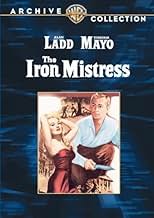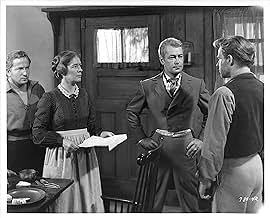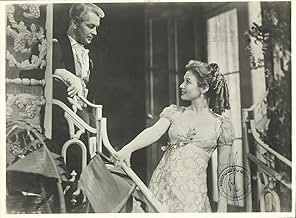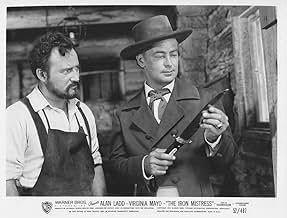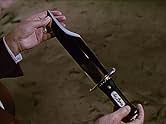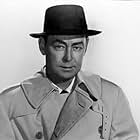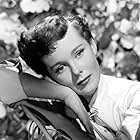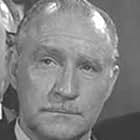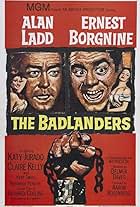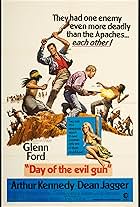The exploits of nineteenth-century pioneer Jim Bowie after settling in New Orleans.The exploits of nineteenth-century pioneer Jim Bowie after settling in New Orleans.The exploits of nineteenth-century pioneer Jim Bowie after settling in New Orleans.
Anthony Caruso
- Black Jack Sturdevant
- (as Tony Caruso)
Nedrick Young
- Henri Contrecourt
- (as Ned Young)
John Alban
- Casino Patron
- (uncredited)
John Albright
- Casino Patron
- (uncredited)
Leon Alton
- Riverboat Passenger
- (uncredited)
John Alvin
- Impatient Man in Tailor's Shop
- (uncredited)
Ernest Anderson
- Riverboat Cabin Boy
- (uncredited)
Walter Bacon
- Casino Patron
- (uncredited)
Salvador Baguez
- Mexican Artist
- (uncredited)
Richard Bartell
- Horse Race Starter
- (uncredited)
John Barton
- Gambling House Patron
- (uncredited)
- Director
- Writers
- All cast & crew
- Production, box office & more at IMDbPro
Storyline
Did you know
- GoofsThe knife-maker claims the meteorite he found is made of steel. Steel is a man-made substance using iron and carbon. Metallic meteorites contain an iron-nickel alloy.
- Quotes
Jim Bowie: Ma...I killed a man.
Mrs. Bowie: Did he need killin'?
Jim Bowie: About as much as any man ever did.
- Crazy creditsPrologue: "Historical truth is sometimes stranger than fiction. James Bowie was an example--literally carving his name in history to become an American legend."
- ConnectionsReferenced in The Red Balloon (1956)
Featured review
The Iron Mistress (1952)
I don't get the whole call of honor that leads to duels at the slightest provocation (or less). In some movies it's a fabulous dramatic point, but here it's a nagging and recurring trick, a reason for some male chest-thumping and a little bloodshed. It also represents the way the movie depends on forced drama to make the events jump.
There are exceptions, like a really beautiful and unusual hand-to-hand knife/sword fight occurring in a darkened room, with an occasional bolt of lightning like a strobe going off. This is cinema trickery, a real pleasure, not part of the real story, but it's a moment of relief from the costume drama and dueling the rest of the time.
This is how this movie goes. Moments of unique drama are followed by long stretches of stiff plot development. I'm not sure how the movie reflects the real story of James Bowie, whose name was given to the famous Bowie knife (knives naturally have a big role in the movie, including the forging of the first true Bowie knife). But what works best is the sense of period sets and time-travel to pre-Civil War Louisiana. The romance isn't highly romantic, and the plot is generally stiff, but it is a kind of history story come to life. If you overlook the obvious liberties and gaffes, it's not an unwatchable movie, just a routine one. Alan Ladd, it must be said, is a little cool even for Alan Ladd (an understated actor).
The film does lay out the gradual shift in cultivation of the South to cotton farming, and brings out lots of old rules like the fact divorce was impossible in Louisiana without an act of the legislature. People interested in this certain kind of movie making, for its own sake, should check out "Drums Along the Mohawk" (a better movie by far, but with a similar feel somehow). Here, the camera-work by the talented John Seitz is strangely dull (though it is in true Technicolor), and the scored music by the incomparable Max Steiner is straight up functional. Most of all, the many ordinary parts are put together without great art or intensity.
I don't get the whole call of honor that leads to duels at the slightest provocation (or less). In some movies it's a fabulous dramatic point, but here it's a nagging and recurring trick, a reason for some male chest-thumping and a little bloodshed. It also represents the way the movie depends on forced drama to make the events jump.
There are exceptions, like a really beautiful and unusual hand-to-hand knife/sword fight occurring in a darkened room, with an occasional bolt of lightning like a strobe going off. This is cinema trickery, a real pleasure, not part of the real story, but it's a moment of relief from the costume drama and dueling the rest of the time.
This is how this movie goes. Moments of unique drama are followed by long stretches of stiff plot development. I'm not sure how the movie reflects the real story of James Bowie, whose name was given to the famous Bowie knife (knives naturally have a big role in the movie, including the forging of the first true Bowie knife). But what works best is the sense of period sets and time-travel to pre-Civil War Louisiana. The romance isn't highly romantic, and the plot is generally stiff, but it is a kind of history story come to life. If you overlook the obvious liberties and gaffes, it's not an unwatchable movie, just a routine one. Alan Ladd, it must be said, is a little cool even for Alan Ladd (an understated actor).
The film does lay out the gradual shift in cultivation of the South to cotton farming, and brings out lots of old rules like the fact divorce was impossible in Louisiana without an act of the legislature. People interested in this certain kind of movie making, for its own sake, should check out "Drums Along the Mohawk" (a better movie by far, but with a similar feel somehow). Here, the camera-work by the talented John Seitz is strangely dull (though it is in true Technicolor), and the scored music by the incomparable Max Steiner is straight up functional. Most of all, the many ordinary parts are put together without great art or intensity.
- secondtake
- Jun 16, 2010
- Permalink
- How long is The Iron Mistress?Powered by Alexa
Details
- Runtime1 hour 50 minutes
- Aspect ratio
- 1.37 : 1
Contribute to this page
Suggest an edit or add missing content



